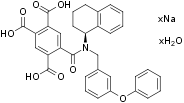Overview
- Jarvis, M.F. et al. (2002) Proc. Natl. Acad. Sci. U.S.A. 99, 17179.
- Donnelly-Roberts, D. et al. (2008) J. Pharmacol. Exp. Ther. 324, 409.
 Alomone Labs A-317491 sodium salt hydrate inhibits P2X3 channels expressed in HEK-293 cells.Dose-response curve of P2X3 inhibition by A-317491 sodium salt hydrate (#A-380). Cells were loaded with Calcium-6 dye, incubated for 5 min with increasing concentrations of A-317491 sodium salt hydrate, and stimulated by 3 µM α,β-MeATP. Changes in intracellular Ca2+ following agonist application were detected as changes in maximum relative fluorescence (RLU) using FLIPRTETRA™. IC50 was determined as 7.84 µM.
Alomone Labs A-317491 sodium salt hydrate inhibits P2X3 channels expressed in HEK-293 cells.Dose-response curve of P2X3 inhibition by A-317491 sodium salt hydrate (#A-380). Cells were loaded with Calcium-6 dye, incubated for 5 min with increasing concentrations of A-317491 sodium salt hydrate, and stimulated by 3 µM α,β-MeATP. Changes in intracellular Ca2+ following agonist application were detected as changes in maximum relative fluorescence (RLU) using FLIPRTETRA™. IC50 was determined as 7.84 µM.
A-317491 is a selective, competitive, non-nucleotide antagonist of P2X3 and P2X2/3 receptors. It is shown to inhibit human homomeric P2X3 and heteromeric P2X2/3 receptors with pIC50 values of ~7 and exhibits almost no antagonistic activity on other P2X family receptors1. The compound is active in chronic inflammatory and neuropathic pain models, but is ineffective in reducing nociception in animal models of acute, postoperative, and visceral pain.
A-317491 is the chiral pure S-enantiomer, while the R-enantiomer, A-317344, shows lower activity at P2X3 and P2X2/3 receptors in vitro and lacks anti-nociceptive effects in animal models. A-317491 shows high systemic bioavailability following subcutaneous administration but lacks oral bioavailability. It is not susceptible to metabolic degradation1,2.
P2X receptors are a family of ion channels gated by ATP. They are expressed in cell types of almost every origin, including neuronal, muscular, epithelial and immune and have been shown to play a pivotal role in models of various pain conditions3.

